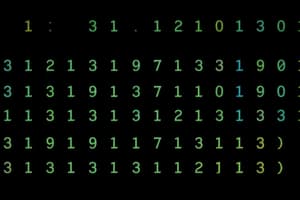Podcast
Questions and Answers
What is the primary benefit of using an ArrayList over a traditional array?
What is the primary benefit of using an ArrayList over a traditional array?
- ArrayLists automatically resize. (correct)
- ArrayLists require manual resizing.
- ArrayLists are more memory efficient than arrays.
- ArrayLists can only store integers.
Which method would you use to determine the number of elements in an ArrayList?
Which method would you use to determine the number of elements in an ArrayList?
- list.count()
- list.length()
- list.size() (correct)
- list.getSize()
What will be the value of val after executing the code 'int val = list.get(1);' if the list contains {5, 3, 10, 4}?
What will be the value of val after executing the code 'int val = list.get(1);' if the list contains {5, 3, 10, 4}?
- 5
- 10
- 3 (correct)
- 4
What happens when you execute 'list.set(2, 88);' on the list {5, 3, 10, 4}?
What happens when you execute 'list.set(2, 88);' on the list {5, 3, 10, 4}?
What is the correct way to loop over an ArrayList named list using an enhanced for loop?
What is the correct way to loop over an ArrayList named list using an enhanced for loop?
What will be printed when executing System.out.println(myList.get(0)); after adding the element 100 to the list?
What will be printed when executing System.out.println(myList.get(0)); after adding the element 100 to the list?
What is the size of the ArrayList numbers after the loop that adds integers from 0 to 99?
What is the size of the ArrayList numbers after the loop that adds integers from 0 to 99?
What value will be at index 3 of the numbers ArrayList after adding the numbers 1 to 5 and 10 at index 3?
What value will be at index 3 of the numbers ArrayList after adding the numbers 1 to 5 and 10 at index 3?
If an attempt is made to access an index that is out of range in an ArrayList, what will occur?
If an attempt is made to access an index that is out of range in an ArrayList, what will occur?
What will happen if you try to retrieve an element from an empty ArrayList?
What will happen if you try to retrieve an element from an empty ArrayList?
What value does the variable 'x' hold when accessing the third element in the second array of myNumbers?
What value does the variable 'x' hold when accessing the third element in the second array of myNumbers?
Which of the following statements about multidimensional arrays is correct?
Which of the following statements about multidimensional arrays is correct?
Which of the following is NOT a constructor for creating an ArrayList?
Which of the following is NOT a constructor for creating an ArrayList?
Which method is used to determine the number of elements in an ArrayList?
Which method is used to determine the number of elements in an ArrayList?
What is a limitation of standard arrays in Java?
What is a limitation of standard arrays in Java?
Which class from the Java collection framework provides a dynamic array?
Which class from the Java collection framework provides a dynamic array?
Which of the following methods is used to remove an element from an ArrayList?
Which of the following methods is used to remove an element from an ArrayList?
Which of the following data types cannot be directly stored in an ArrayList?
Which of the following data types cannot be directly stored in an ArrayList?
What is the primary characteristic of an array in programming?
What is the primary characteristic of an array in programming?
Which of the following statements correctly describes array instantiation?
Which of the following statements correctly describes array instantiation?
Which of the following correctly represents the syntax for a for loop in Java?
Which of the following correctly represents the syntax for a for loop in Java?
What happens when the Boolean expression in a while loop evaluates to false?
What happens when the Boolean expression in a while loop evaluates to false?
In Java, how do you access the first element of an array named arr?
In Java, how do you access the first element of an array named arr?
What is a potential issue if you try to access an index that is out of bounds in an array?
What is a potential issue if you try to access an index that is out of bounds in an array?
What type of loop is best suited for situations where the number of iterations is known beforehand?
What type of loop is best suited for situations where the number of iterations is known beforehand?
Which of the following best describes the declaration of an array in Java?
Which of the following best describes the declaration of an array in Java?
What is the correct syntax for instantiating an array of integers?
What is the correct syntax for instantiating an array of integers?
How can you change the second element of a String array named 'cars'?
How can you change the second element of a String array named 'cars'?
Which statement correctly loops through all elements in an array using a for-each loop?
Which statement correctly loops through all elements in an array using a for-each loop?
What is required to access an element in a two-dimensional array?
What is required to access an element in a two-dimensional array?
Which of the following correctly initializes an array with specific values?
Which of the following correctly initializes an array with specific values?
In the context of arrays, what does the '.length' property signify?
In the context of arrays, what does the '.length' property signify?
What will be the output of the following code? String[] cars = {"Volvo", "BMW", "Ford"}; System.out.print(cars[0] + ", "); System.out.print(cars[1] + ", "); System.out.println(cars[2]);
What will be the output of the following code? String[] cars = {"Volvo", "BMW", "Ford"}; System.out.print(cars[0] + ", "); System.out.print(cars[1] + ", "); System.out.println(cars[2]);
Which of the following statements about array elements is false?
Which of the following statements about array elements is false?
Flashcards are hidden until you start studying
Study Notes
Repetition Statements
- A loop structure repeatedly executes a block of code "as long as" a tested expression is true.
- If a loop's tested Boolean expression is true, a block of statements called the loop body executes. This occurs before the Boolean Expression is evaluated again.
Arrays
- An array is a container object holding a fixed number of values of the same type.
- Array length is set when the array is created.
- Each array item (element) is accessed by a numerical index.
- Arrays are declared using
[ ]after the data type. - Array instantiation uses the
newkeyword and specifies the array's dimensions. - Array initialization assigns values to the elements. This can be done during instantiation or by assigning values by their indices.
- Looping through arrays can use the
forloop or the for-each loop.
Two-Dimensional Arrays
- A multidimensional array holds one or more arrays.
- Creating a two-dimensional array involves placing each array within its curly braces.
- Accessing elements in a two-dimensional array requires specifying two indices: one for the array and one for the element within that array.
- Looping through a two-dimensional array requires nested
forloops, one for each dimension.
ArrayList
ArrayListis a dynamic array, meaning it can grow as needed.- It is easier to manipulate than a traditional array (e.g., removing elements).
- It can only hold objects, not primitive data types.
- The
java.utilpackage contains theArrayListclass. - There are several constructors for
ArrayListto create an empty list, initialize it with a collection or set an initial capacity. - Common methods for
ArrayListinclude:add(Object o): Adds an element to the end of the list.remove(int index): Removes an element at a specific index.set(int index, Object o): Replaces the element at a specific index with another element.contains(Object o): Checks if the list contains a specific element.indexOf(Object o): Returns the index of the first occurrence of a specific element.get(int index): Retrieves the element at a specific index.clear(): Removes all elements from the list.size(): Returns the number of elements in the list.
ArrayList vs. Array
- Arrays have a fixed size, while
ArrayListcan grow dynamically. ArrayListoffers more functionalities than arrays, like removing elements, easily finding elements, resizing, etc.
Using ArrayList
- Importing the
ArrayListclass is needed for using it. - Creating an
ArrayListis done using the syntax:ArrayList list = new ArrayList(); - Adding elements to an
ArrayListis done using theadd()method. - Retrieving an element from an
ArrayListis done using theget(index)method. - Modifying an existing element in an
ArrayListis done using theset(index, value)method. - Determining the size of an
ArrayListis done using thesize()method. - Looping through elements in an
ArrayListcan be done with a for loop, a for-each loop, or an iterator (not discussed in the text).
Studying That Suits You
Use AI to generate personalized quizzes and flashcards to suit your learning preferences.




